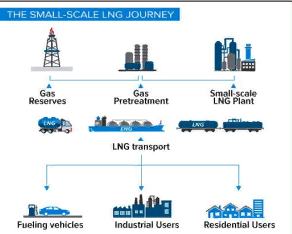Ahmedabad
(Head Office)Address : 506, 3rd EYE THREE (III), Opp. Induben Khakhrawala, Girish Cold Drink Cross Road, CG Road, Navrangpura, Ahmedabad, 380009.
Mobile : 8469231587 / 9586028957
Telephone : 079-40098991
E-mail: dics.upsc@gmail.com

Small-scale liquefied natural gas (SSLNG)
News: Recently, Union minister of Oil and Natural Gas, has recently dedicated to the nation India’s first small-scale liquefied natural gas (SSLNG) unit at GAIL (India) Ltd’s Vijaipur complex in Madhya Pradesh.
What is SSLNG?
Small-Scale Liquefied Natural Gas (SSLNG) refers to the production, transportation, and use of liquefied natural gas (LNG) on a smaller scale compared to conventional
large operations.
What is LNG?
LNG is natural gas that has been cooled to a liquid state for storage and shipping.
It is odorless, colorless, non-toxic, and non-corrosive.
Composed almost entirely of methane, it has less carbon content than other fossil fuels.
LNG typically contains 85–95% methane and emits 40% less carbon dioxide than coal and 30% less than oil. It also produces no soot, dust, or particulates.
What is the significance of SSLNG unit?
Transition to green energy: The government aims to increase the share of natural gas in its primary energy mix to 15% by 2030 from 6% at present. This is because natural gas is far less polluting than conventional hydrocarbons like coal and oil. It is seen as a key transition fuel in India’s journey towards green energy and future fuels.
De-carbonization of transportation sector: It is cleaner fuel with reduced emission of carbon dioxide and negligible amounts of particulate matter, nitrogen oxide, and Sulphur dioxide as compared to diesel.
Save forex reserve: It is usually cheaper than crude oil, from which diesel is derived. Thus, replacing a major chunk of India’s diesel consumption by LNG could lead to substantial foreign exchange savings.
Local Accessibility: SSLNG units allow for the production and distribution of LNG on a smaller scale, making it accessible to regions that may not have large-scale infrastructure.
Diversification of Energy Sources: SSLNG promotes the use of natural gas as an alternative to other fossil fuels like coal and oil. By diversifying energy sources, countries can reduce their dependence on a single fuel type and enhance energy security.
Economic Benefits: SSLNG units create local jobs during construction, operation, and maintenance. They support economic growth by enabling small and medium-sized enterprises to participate in the LNG value chain.
What are the challenges in its wider adoption?
Paucity of LNG-powered vehicles: There is shortage of LNG-powered vehicles in India.
High cost: The LNG-powered vehicles have higher initial cost as compared to diesel run vehicles.
Financing ecosystem: India does not have a robust LNG vehicle financing ecosystem.
Retail network: India does not have LNG retail network.

Address : 506, 3rd EYE THREE (III), Opp. Induben Khakhrawala, Girish Cold Drink Cross Road, CG Road, Navrangpura, Ahmedabad, 380009.
Mobile : 8469231587 / 9586028957
Telephone : 079-40098991
E-mail: dics.upsc@gmail.com
Address: A-306, The Landmark, Urjanagar-1, Opp. Spicy Street, Kudasan – Por Road, Kudasan, Gandhinagar – 382421
Mobile : 9723832444 / 9723932444
E-mail: dics.gnagar@gmail.com
Address: 2nd Floor, 9 Shivali Society, L&T Circle, opp. Ratri Bazar, Karelibaugh, Vadodara, 390018
Mobile : 9725692037 / 9725692054
E-mail: dics.vadodara@gmail.com
Address: 403, Raj Victoria, Opp. Pal Walkway, Near Galaxy Circle, Pal, Surat-394510
Mobile : 8401031583 / 8401031587
E-mail: dics.surat@gmail.com
Address: 303,305 K 158 Complex Above Magson, Sindhubhavan Road Ahmedabad-380059
Mobile : 9974751177 / 8469231587
E-mail: dicssbr@gmail.com
Address: 57/17, 2nd Floor, Old Rajinder Nagar Market, Bada Bazaar Marg, Delhi-60
Mobile : 9104830862 / 9104830865
E-mail: dics.newdelhi@gmail.com